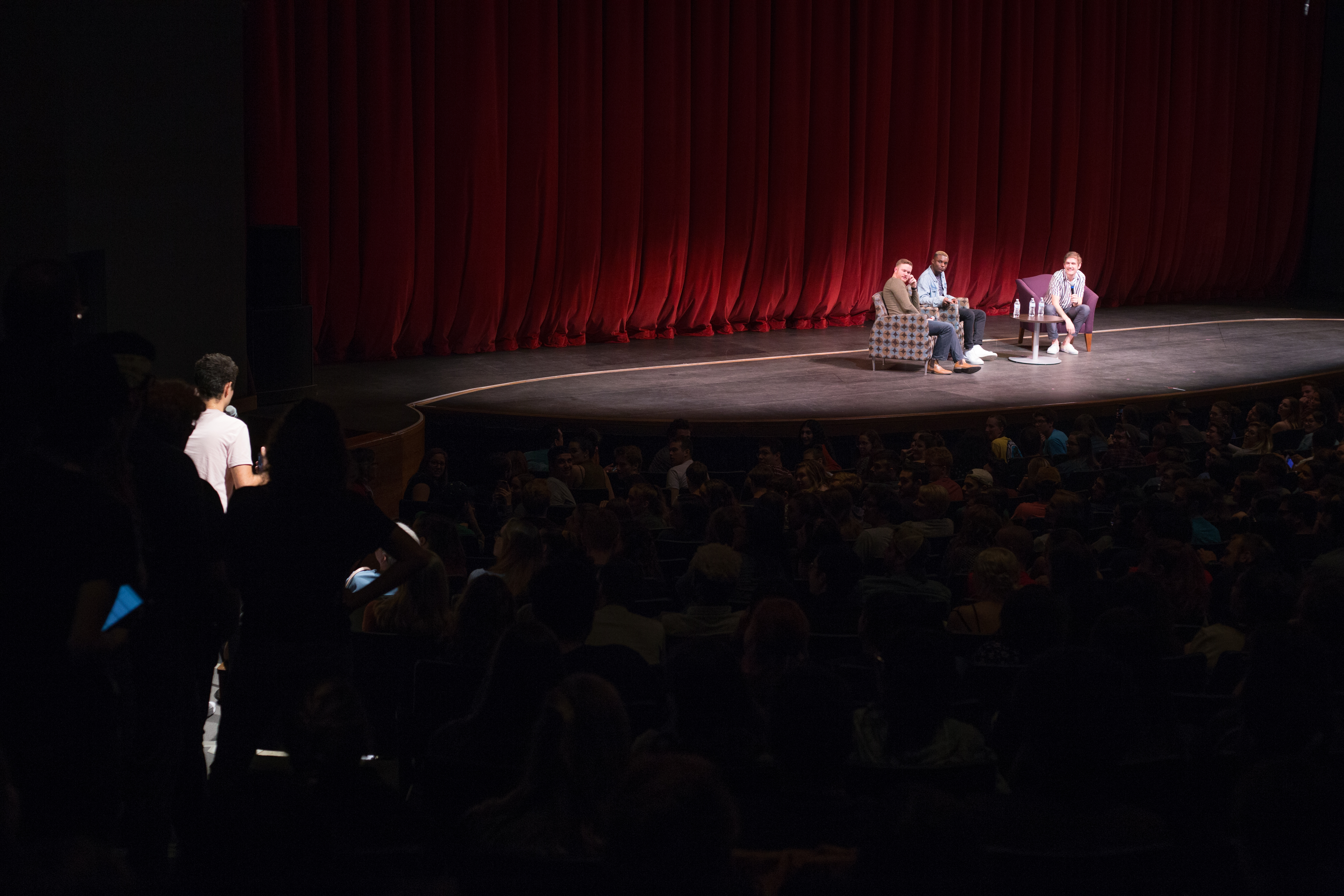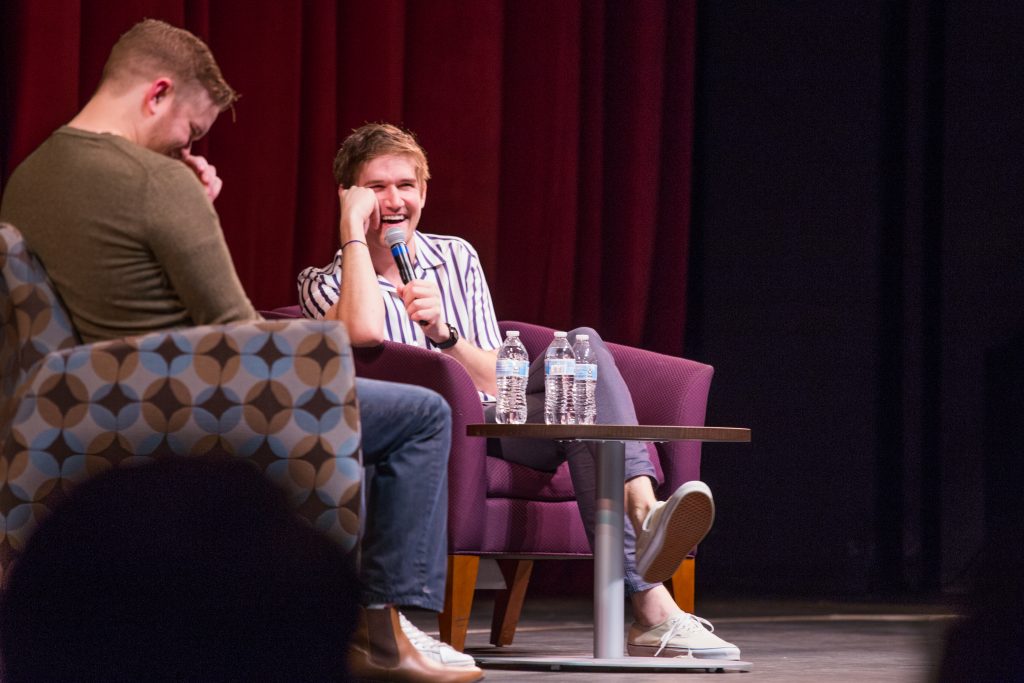Bo Burnham sat down with Orrin Kenyon, assistant director for the University Union, and Courtney Mitchell, the Student Association (SA) vice president for programming and a senior majoring in computer science, along with a sold-out crowd in the Osterhout Concert Theater in the Anderson Center. In a two-hour Q&A-style conversation, Burnham touched on being a director, producer and comedian in 2018, spoke on social media and its intersectionality with politics, youth, anxiety, performing, comedy and simply being a person.
Burnham started his career on YouTube back in 2006, posting videos of skits meant for his brother, who was away at college, to see. Today, Burnham has over 1.5 million subscribers and has logged over 200 million views on his videos, along with three stand-up comedy specials. For his latest project, he’s behind the camera to write and direct his feature film, “Eighth Grade.” The comedy-drama follows the struggles of an anxious eighth-grader during her last week of classes before embarking for high school and tells the story of an average, unpolished, awkward 13-year-old girl.
“I’ve watched YouTube videos and it’s pretty much true that the boys talked about ‘Fortnite’ and the girls talked about their souls,” Burnham said. “I mean, partly it’s that age and partly it’s that — I’m not a cultural sociologist or whatever, but I think at that age, you ask boys, ‘What do you like to do?’ and you ask girls, ‘Who are you?’ And girls have to go deeper way quicker, I think they’re just sort of forced to think of themselves existentially in the world, which is a huge weight, meanwhile boys, it’s just like, ‘Don’t eat too much dirt!’ The attempt at a performed public truth is the truth to me. It’s the truth of the moment. I know this is a smidge away from sounding like nonsense, but it makes sense to me. I walked away and was like, I know exactly what you’re feeling, and I hope that I’m able to do that. It’s not just for women, why can’t everyone see themselves in her? We all see ourselves in cowboys, we all see ourselves in astronauts, why can’t we see ourselves in a 13-year-old girl? Why can’t she be a conduit for the human condition?”
Burnham curiously answered each question, taking a few pregnant pauses to collect answers to the questions Kenyon, Mitchell and the audience asked. Though he lost track of the original question, it seemed to be indicative of the goodness and provocation of the questions he was being asked. At 28 years old, Burnham seemed to have an acute awareness of the impact of social media on global culture as a whole, wanting to extend to the college-aged audience the knowledge he’d gathered from his unique experience as a content creator who had been there before the crest of YouTube and explosion of social media.
“That’s the point of this age — to hold convictions strongly, stand up and speak with conviction,” Burnham said. “Maybe fail out loud a little bit. Maybe overreach a little. My certainty has sort of waned away; I have no idea what the question I’m answering is. That is something that is more interesting to me now, which is certainly what I tried to do in ‘Eighth Grade.’ I tried to present my audience with the things I’m struggling with, with things I don’t understand to presume that they are as deep and intelligent as me. I presume that a 13-year-old girl is as deep and intelligent as me because they act the same as me. The older I get, the more I’m more interested in a conversation rather than talking.”

Bo Burnham, director and comedian, among other things, was featured in the Distinguished Speaker Series at the Osterhout Concert Theater on Oct. 7.
“I first heard about Bo Burnham when ‘what.’ came out,” said Liam Carey, a junior majoring in economics. “My friend saw it and kept talking about how amazing it was, so I checked it out. I loved it. I thought the talk was incredible; just how smart and well-spoken he was about everything and how he’d keep going and give long, complicated answers. Everything he was saying was so real and honest.”
“I feel like you got to know him on a more personal level,” said Jeff Koutsantanou, a junior majoring in accounting. “He wasn’t trying to put on a show, he was just having a conversation. It was interesting to be able to see that side of him, since he’s a really funny comedian, too.”
Burnham talked a lot about the themes and creation of “Eighth Grade.” One student asked him about his experience working with the kids on set.
“All the extras, we had open call in the town we were at, I sat down with them one by one because I wanted them to feel comfortable when they showed up on set. Every kid is important, every kid had to feel really comfortable. I said to one girl, ‘What’s your name,’ and she said her name and I asked her for a special talent and she said, ‘I have eczema.’ There was another kid that was eating a bell pepper like an apple. They’re perfect. They couldn’t not be eighth-graders if they tried,” Burnham said. “It’s unsurprising that a generation of kids that self-documents was very comfortable on camera. They did not give a shit about the cameras — for them, it was just another camera in the room. They were already filming themselves all the time. They didn’t stiffen up, or they stiffened up in the exact right way.”
Even if you haven’t seen the movie, the themes are easy to relate to even on a conversational level. Much of our generation has Facebook to remind us of the five-year anniversaries of duck face-clad, sepia-filtered photoshoots, delivering to us a time capsule of the anxieties and blissful memories from middle school. The movie speaks to the ubiquity of those feelings beyond the scope of the eighth grade, and made for a meaningful conversation about universal struggles everyone can face.
“I would say one of the biggest takeaways was he was talking about ‘Eighth Grade,’” Carey said. “He made that movie for him, not about him. He didn’t want to make a movie about a comedian who’s on a national stage having anxiety problems, so he kind of related those feelings to a broader audience by putting them through the lens of a 13-year-old girl [whom] people can relate to and understand. I didn’t know that he was kind of relating that to himself in such a deep way, but it makes a lot of sense now.”



